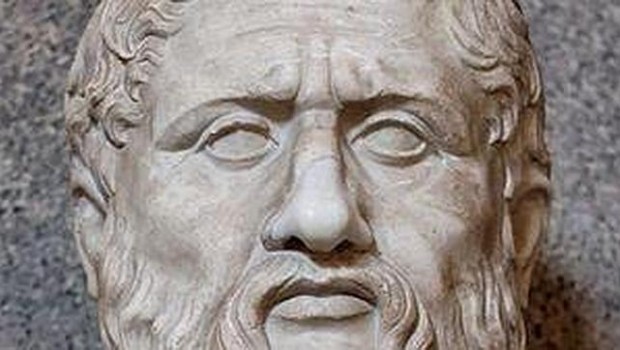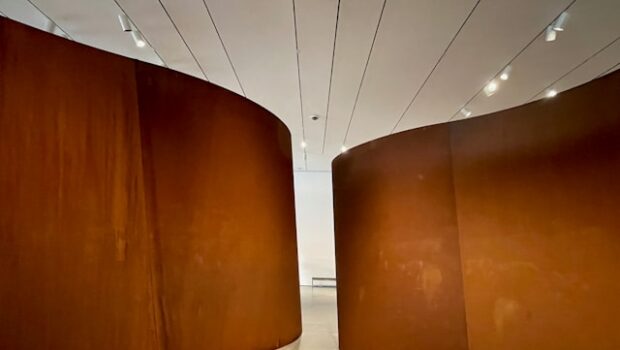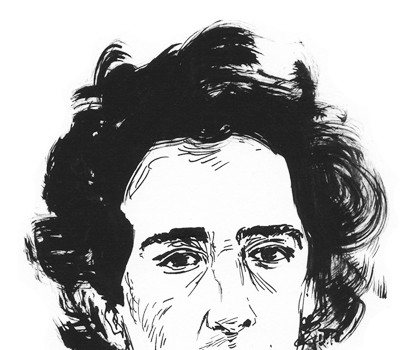Plato’s Musical Structure: Jay Kennedy
Rose Mary Salum
Professor Jay Kennedy, a historian and philosopher of science, had claimed that Plato’s dialogues contain a mathematical and musical structure. When he was teaching a course on Plato’s Republic, and a second one that dealt with Pythagorean mathematics and music, he began to suspect that, in fact, Plato, used hidden musical symbolism. He rearranged Plato´s texts into the form they would have had on the original papyri and discovered a pattern. The musical and mathematical structures he hid in his writings might show that he was committed to the radical idea that the universe is controlled not by the gods on Olympus, but by mathematical and scientific law. It also shows how to combine science and religion. Kennedy further argues that this pattern supports the claim made by Aristotle that Plato was a Pythagorean. Literal had the opportunity to talk to Jay Kennedy to learn more about his discoveries.
* * *
The fact that Plato’s writings were not symbolic became the standard view among modern scholars and has remained so ever since. So what exactly made you go back to the idea of symbols in Plato´s philosophy? What series of insights led you to the conclusion that the Republic did use symbols?
JK: Many of Plato’s readers feel that there is something between the lines. I was fortunate to be lecturing on the puzzling narrative structure of the Republic at the same time I was teaching another course on the mathematics and music theory of the ancient Pythagoreans. I realized that the music theory was the key to the Republic’s structure.
Birt, Harris, Dodds and many other experts have made stichometric studies, but you’re the first one to arrive at these findings. What makes you different from them? Why are you the first since Hellenistic times to see the dialogues as they left Plato’s hand and come up with these conclusions?
JK: Previous stichometric studies were aimed at determining the format of Plato’s original manuscripts. I was perhaps the first to think that the narratives had a musical structure, which could be found by counting the Greek lines in the dialogues. In the classical period, literary book-scrolls were produced with uniform columns, each with a uniform number of lines. So counting lines was as easy as counting off the number of columns. From Hellenistic times onwards, cheaper editions were produced without this format. Thus, detecting Plato’s musical schemes was probably impossible until the invention of the word processor. I’ve just finished the manuscript for my book, The Musical Structure of Plato’s Dialogues (Acumen Publishing, April 2011), which introduces this background and shows how musical symbols change the way we read the dialogues.
Why did Plato’s followers stop interpreting the dialogues symbolically? Does this discovery of yours also shift our views on Aristotle and Plato´s followers?
JK: Plato’s followers read the dialogues symbolically from about the first century AD until the Renaissance. The anti-allegorical turn has an interesting history.
The Roman Catholic Church had become identified with allegory. It claimed that special techniques were needed to read the Bible, and these made priests necessary. Luther and the Reformation attacked allegory and turned toward the literal reading of scripture. Protestant theologians were the first to turn against the symbolical reading of Plato, and the first to invent the idea that the so-called `neo-Platonists’ were not true to Plato. Modern classics scholarship was influenced by this turn in the Reformation. I think literalism persisted in Plato studies partly because of this background and partly because most Plato scholars today are not familiar with the music theory needed to see and decipher Plato’s musical symbolism.
Your claims promise to revolutionize the history of the birth of Western thought. How is that so?
JK: These findings do open up many new lines of research which promise to revise our understanding of ancient Greek philosophy, science, literature, politics, and music theory. Plato is sometimes stereotyped as a cold fish who pushed Western culture away from poetry and toward reason, logic, and mathematics. But Plato looks very different now. We can see him as part of a radical, persecuted political movement, the Pythagoreans. We see him as a writer who resorted to symbols to hide his most dangerous views. We see him as presenting himself openly as a champion of reason, but hiding another side, his romantic and mystical side.
You said that “the Pythagorean tradition before Plato remains shadowy, but all concur that it held that the cosmos and everything within it had some underlying mathematical structure. According to their beautiful doctrine, even the planets revolving in their orbits sounded a symphony of tones with regular mathematical intervals. This ‘harmony of the spheres’ could, some said, only be heard by the wise.” Isn’t this just basic numerology?
JK: Scholars like Keith Thomas and Francis Yates have studied the history of esotericism in modern Europe and, yes, the numerology of the Pythagoreans was prominent in that tradition (and in novels like the Da Vinci Code). The roots of that tradition were, however, hard to pin down. No writings from the Pythagoreans survive from before Plato. The symbolic structures in Plato’s dialogues now give us the first hard evidence about the origins of those numerological ideas. Numerology, astrology, and alchemy were arguably mainstream science until the Scientific Revolution, and now we have a much clearer picture of their roots in ancient Greece.
You also arrived at the conclusion that Plato was at the forefront of the advanced mathematics of his day, as some of his followers said. What exactly do these numbers add to his philosophy? What exactly do you think it can be found in this new discovery of yours?
JK: It is first important to establish that the dialogues have a musical and symbolical structure, and this is the project of the forthcoming book. These musical symbols can be studied rigorously and objectively because they repeat at regular intervals and form a wellknown musical scale. A subsequent book will turn to a second kind of symbol and show that they contain Plato’s positive philosophy. If I may, however, I would like to focus first on the arguments about the dialogue’s musical structure.
The neo-Pythagoreans, the neo-Platonists, and Renaissance Platonists – all agreed that symbols and allegory were used to give the dialogues different levels of meaning. What are all these meanings?
JK: It was common in ancient times, among religious sects, guilds, and clubs, to `reserve’ certain hidden doctrines to initiates. The philosophers you mention typically said both that Plato did employ symbols and that they would not divulge his hidden philosophy. This seemed to be frivolous but now must be re-examined.
Why, though, did Plato choose to hide his doctrines in this way?
JK: Richard Janko, at the University of Michigan, has written about the politics of allegory and symbolism in classical Athens (see Socrates the Free-Thinker in the Blackwell Companion to Socrates). In short, during the war with Sparta, philosophers who advocated the new physics and monotheism were persecuted as `atheists’ since they opposed the old pagan deities. In the circles around Socrates, some of these attempted to show that the traditional myths did conceal hints of deeper philosophies, and so pioneered allegorical interpretation. This attempted reconciliation of old and new failed and, though Socrates protested he was no atheist in the Apology, he was executed for impiety. Janko argues that this episode influenced the next generation, including Plato. Socrates’ execution was one motivation for Plato’s discretion.
You mentioned in an article that “the number twelve plays some role in the structure of the dialogues. Further examinations led to a surprising and beautiful insight. Plato embedded a twelve-note musical scale in each of his dialogues. That is, at one-twelfth of the way through each text he inserted a symbol, then at two-twelfths another, related symbol, and so on.” Why that the number twelve? What did 12 mean to the Greeks?
JK: The number twelve has played a role in many musical systems simply because it has many factors. Pythagoras himself probably discovered that the musical harmonies were associated with simple fractions like 1 to 2, 2 to 3, and 3 to 4. If a string is marked off in twelve equal units, it is easy to find the more harmonious notes. Theon of Smyrna wrote a book about the first century AD called On the Mathematics Useful for Reading Plato. He recommended that students of Plato learn about this twelve-note scale–even though it is not openly mentioned in the dialogues.
Your discoveries reveal an unknown Plato. They show an extremely encyclopedic person who found the way to come up with a flawless philosophy that contained (now we know) a hidden knowledge embedded in it. In contrast to the 21st Century, we find ourselves in a society that conforms itself with a Twitter format of 140 words. I don’t mean to underestimate today’s society, but it is the perfect metaphor of a civilization that does not wish to or have time to think. Your views on this subject?
JK: Plato gave dignity to the life of the mind. He aimed at pushing European culture away from a society of warriors and merchants and towards a society of open intellectual inquiry and debate. To a surprising degree, he succeeded. Even today, it is the Greek legacy of science, mathematics, rationality, and democracy which promises to be the common core of our new global culture. Science has also produced the Internet and Twitter, and these present both opportunities and dangers for the life of the mind. However, we are in the first generation of living with these technologies, and there surely will be a backlash against the distraction and the atomization of discourse that they promote.
Plato’s dialogues are dazzling and provocative even for those who read them quickly. We now know that he also wrote for slow readers. The dialogues are a kind of wisdom literature, meant to conceal their secrets from all except those who return to them again and again. We are still learning from Plato.
Posted: April 24, 2012 at 6:36 pm










